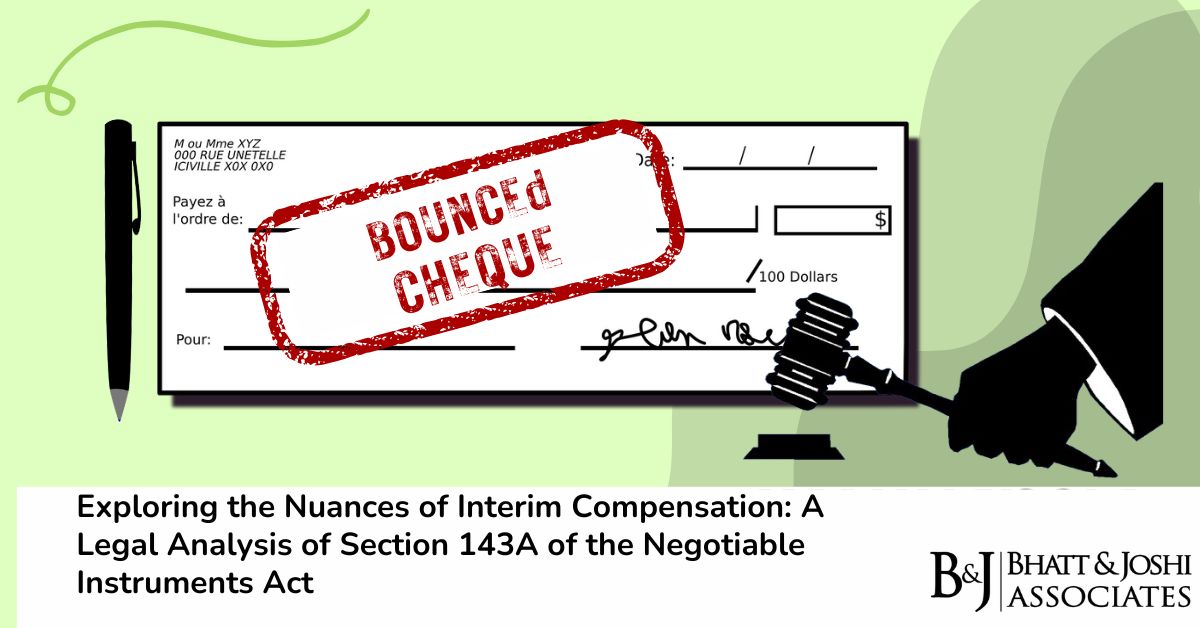Interim Compensation under Section 143A of the Negotiable Instruments Act: Exploring Legal Nuances
Introduction
In a recent pronouncement on March 15, the Supreme Court of India rendered a significant observation regarding the disbursement of interim compensation under Section 143A(1) of the Negotiable Instruments Act (N.I. Act). The Court clarified that the mere filing of a cheque dishonor complaint under the N.I. Act does not automatically entitle the complainant to seek interim compensation. Rather, it emphasized that the power to grant such compensation remains discretionary and necessitates a prima facie assessment of the case’s merits. This article delves into the intricate legal framework surrounding Section 143A of the N.I. Act, examining its interpretation, purpose, parameters for discretion, case analysis, judicial scrutiny, and the broader implications of the Supreme Court’s directive.
Understanding Section 143A: Interpretation and Significance of Interim Compensation
Section 143A of the Negotiable Instruments Act was introduced as an amendment to address the prevalent issue of delays in resolving cheque dishonor cases. Its primary objective was to expedite the resolution process and prevent unjust enrichment of dishonest cheque drawers. This provision empowers courts to grant interim compensation to complainants who face financial hardship due to prolonged legal proceedings. However, the interpretation of Section 143A(1) has been a subject of contention, particularly regarding the discretionary nature of granting interim relief.
Context and Background: The Supreme Court’s Intervention
In a recent case, the Supreme Court Bench comprising Justices Abhay S. Oka and Ujjal Bhuyan overturned the findings of both the High Court and the Trial Court. The Court observed that courts should exercise caution in granting interim compensation to complainants at the outset of legal proceedings. Moreover, it highlighted the potential ramifications of interpreting the word ‘may’ in Section 143A(1) as ‘shall,’ which could lead to a mandatory imposition of interim compensation in every complaint under Section 138.
Exploring the Parameters of Discretion: Factors Considered
The Supreme Court delineated several parameters for exercising discretion under Section 143A. These include evaluating the merits of the case, considering the financial distress of the accused, and assessing the complainant’s prima facie case. Additionally, courts must analyze the nature of the transaction and the relationship between the parties involved before granting interim compensation. This nuanced approach ensures that interim compensation is granted judiciously and in line with the objectives of the legislation.
Case Analysis: Application of Interim Compensation under Section 143A in Practice
The case under scrutiny involved a complaint filed under Section 138 of the N.I. Act, wherein the complainant sought interim relief following the dishonor of a cheque by the bank. While the Trial Court and the High Court upheld the grant of interim compensation, the Supreme Court identified procedural flaws and emphasized the importance of a comprehensive evaluation of the case’s merits. This case analysis underscores the significance of judicial scrutiny in ensuring the fair application of Section 143A.
Judicial Scrutiny and Prudence: Ensuring Fairness in Interim Compensation Decision-Making
The Supreme Court emphasized the importance of recording reasons while granting interim relief and cautioned against mechanical decisions. It reiterated that the presumption under Section 139 of the N.I. Act is rebuttable and cannot serve as the sole basis for directing interim compensation. Instead, courts must conduct a holistic assessment of all relevant factors before exercising discretion under Section 143A.
Conclusion: Upholding Principles of Fairness and Justice
In conclusion, the Supreme Court’s directive regarding Section 143A of the N.I. Act reaffirms the principles of fairness and justice in legal proceedings. By emphasizing the discretionary nature of granting interim compensation and outlining parameters for its exercise, the Court ensures that such compensation is awarded judiciously and in accordance with the law. This ruling underscores the importance of balanced decision-making and upholding the integrity of the legal system in cheque dishonor cases.
 Whatsapp
Whatsapp


